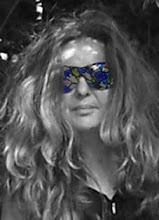Muerte de un naturalista
Durante todo el año la laguna de lino supuraba en el corazón
del pueblo; verde y de flor pesada
el lino se pudrió allí, lastrado por enormes terrones.
se abrasaba cada día bajo un sol de justicia.
Gorjeo delicado de burbujas, moscardones azules
tejían una sólida gasa de sonido entorno al olor.
Había libélulas, mariposas moteadas,
pero lo mejor de todo era esa baba tibia y densa
de las huevas de rana que crecían como agua coagulada
a la sombra de las orillas. Aquí cada primavera
me gustaba llenar tarros de mermelada con los gelatinosos
granos y los alineaba en los alféizares de casa,
y en la escuela sobre las repisas, y esperaba y miraba
hasta que aquellos puntos crecían y estallaban en ágiles
renacuajos nadadores. La señorita Walls nos contaba
que a papá rana se le llamaba rana toro
cómo croaba, y como mamá rana
depositaba cientos de pequeños huevecillos que eran las
huevas de rana. También se podía predecir el tiempo por las ranas,
pues eran de color amarillo con el sol y marrones
con la lluvia.
Pero un día abrasador cuando los campos apestaban
por el estiércol de vaca en la hierba, las ranas enfadadas
invadieron la laguna del lino; atravesé agazapado entre los matorrales
y al son de un áspero croar que no había oído
antes.
El aire comenzó a espesarse con el coro de bajos.
Justo al pie de la charca las ranas panzudas estaban
alerta
sobre la hierba; sus cuellos flojos se hinchaban como velas.
Algunas saltaban; los chapoteos eran obscenas amenazas.
Otras estaban quietas
inmóviles como granadas de lodo, sus cabezas chatas pedorreaban.
Enfermo de asco, me di la vuelta y corrí. Los grandes reyes del limo
se habían reunido para vengarse y sabía
que si metía la mano las huevas la agarrarían.
Death of a Naturalist
All year the flax-dam festered in the heart
Of the townland; green and heavy headed
Flax had rotted there, weighted down by huge sods.
Daily it sweltered in the punishing sun.
Bubbles gargled delicately, bluebottles
Wove a strong gauze of sound around the smell.
There were dragon-flies, spotted butterflies,
But best of all was the warm thick slobber
Of frogspawn that grew like clotted water
In the shade of the banks. Here, every spring
I would fill jampotfuls of the jellied
Specks to range on window-sills at home,
On shelves at school, and wait and watch until
The fattening dots burst into nimble-
Swimming tadpoles. Miss Walls would tell us how
The daddy frog was called a bullfrog
And how he croaked and how the mammy frog
Laid hundreds of little eggs and this was
Frogspawn. You could tell the weather by frogs too
For they were yellow in the sun and brown
In rain.
Then one hot day when fields were rank
With cowdung in the grass the angry frogs
Invaded the flax-dam; I ducked through hedges
To a coarse croaking that I had not heard
Before. The air was thick with a bass chorus.
Right down the dam gross-bellied frogs were cocked
On sods; their loose necks pulsed like sails. Some hopped:
The slap and plop were obscene threats. Some sat
Poised like mud grenades, their blunt heads farting.
I sickened, turned, and ran. The great slime kings
Were gathered there for vengeance and I knew
That if I dipped my hand the spawn would clutch it.
Personal helicón
Cuando era niño no podían apartarme de los pozos
y de las viejas bombas de agua con canjilones y poleas.
Amaba el vacío oscuro, el cielo atrapado, los olores
a maleza, a hongos, a musgo húmedo.
Había uno en una fábrica de ladrillos con un tablero de madera podrida.
Me gustaba el choque sonoro cuando un cubo
caía en picado hasta el final de la cuerda,
tan hondo que no se veía ningún reflejo.
Había otro, poco profundo, cubierto con una piedra,
que florecía como un acuario.
Si arrancabas las largas raíces del lodo blando,
Una cara blanca se movía sobre el fondo.
Otros tenían eco, te devolvían tu propia voz,
con una nueva música más clara. Y había uno
que me asustaba, porque allí, saliendo de los helechos
y las altas hierbas gigantescas, una rata abofeteó mi reflejo.
Ahora ya, escarbar en las raíces, manosear el lodo
y mirarse asombrado, como Narciso, en una fuente,
no es propio de un adulto. Escribo poesías
para verme a mí mismo, para que la oscuridad me responda con el eco.
Personal Helicon
As a child, they could not keep me from wells
And old pumps with buckets and windlasses.
I loved the dark drop, the trapped sky, the smells
Of waterweed, fungus and dank moss.
One, in a brickyard, with a rotted board top.
I savoured the rich crash when a bucket
Plummeted down at the end of a rope.
So deep you saw no reflection in it.
A shallow one under a dry stone ditch
Fructified like any aquarium.
When you dragged out long roots from the soft mulch
A white face hovered over the bottom.
Others had echoes, gave back your own call
With a clean new music in it. And one
Was scaresome, for there, out of ferns and tall
Foxgloves, a rat slapped across my reflection.
Now, to pry into roots, to finger slime,
To stare, big-eyed Narcissus, into some spring
Is beneath all adult dignity. I rhyme
To see myself, to set the darkness echoing.
"Personal Helicon" Seamus Heaney, de Death of a Naturalist, 1966.
























No hay comentarios:
Publicar un comentario